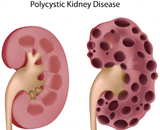Polycystic kidney disease is a genetic disorder in which abnormal cysts develop and grow in the kidneys. Cystic disorders can express themselves at any point, infancy, childhood, or adulthood. The disease occurs in humans and some other animals. PKD is characterized by the presence of multiple cysts typically in both kidneys; however, 17% of cases initially present with observable disease in one kidney, with most cases progressing to bilateral disease in adulthood. Polycystic kidney disease is a general term for the two types of PKD, each having their own pathology and causes. The two types of PKD are autosomal dominant polycystic kidney disease (ADPKD) and autosomal recessive polycystic kidney disease (ARPKD), which differ in their mode of genetic inheritance.

